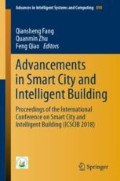Abstract
The optimization of a complex system with multiple subsystems is a tough problem. In this paper, a Decentralized differential evolutionary algorithm (DDEA) is proposed. The simulations for both DDEA and centralized DE on three benchmark functions are carried out. The numerical results show that DDEA is efficient to solve decentralized optimization problems. On these problems, the proposed DDEA outperforms centralized DE in convergence.
Access this chapter
Tax calculation will be finalised at checkout
Purchases are for personal use only
References
Inalhan, G., Stipanovic, D.M., Tomlin, C.J.: Decentralized optimization, with application to multiple aircraft coordination. In: Decision and Control, 2002, Proceedings of the 41st IEEE Conference, vol. 1, pp. 1147–1155. IEEE (2002)
Zhuang, L., Chen, X., Guan, X.: A decentralized ordinal optimization for energy saving of an HVAC system. In: American Control Conference (ACC), 2016, pp. 611–616. IEEE (2016)
Shi, W., Ling, Q., Wu, G., Yin, W.: Extra: an exact first-order algorithm for decentralized consensus optimization. SIAM J. Optim. 25(2), 944–966 (2015)
Johansson, B.: On distributed optimization in networked systems. Ph.D. Telecommunication (2008)
Das, S., Suganthan, P.N.: Differential evolution: a survey of the state-of-the-art. IEEE Trans. Evol. Comput. 15(1), 4–31 (2011)
Price, K., Price, K.: Differential Evolution—A Simple and Efficient Heuristic for Global Optimization over Continuous Spaces. Kluwer Academic Publishers (1997)
Yao, X., Liu, Y., Lin, G.: Evolutionary programming made faster. IEEE Trans. Evol. Comput. 3(2), 82–102 (1999)
Rosenbrock, H.H.: An automatic method for finding the greatest or least value of a function. Comput. J. 3(3), 175–184 (1960); Floudas, C.A., Pardalos, P.M.: A Collection of Test Problems for Constrained Global Optimization Algorithms. Springer Berlin Heidelberg (1990)
Fiacco, A.V., McCormick, G.P.: Nonlinear Programming: Sequential Unconstrained Minimization Techniques, vol. 4. Siam (1990)
Acknowledgements
This work was supported by National Key Research and Development Project of China (No. 2017YFC0704100 entitled New generation intelligent building platform techniques, and 2016YFB0901900), the National Natural Science Foundation of China (No. 61425027), the 111 International Collaboration Program of China under Grant B06002, and Special fund of Suzhou-Tsinghua Innovation Leading Action (Project Number: 2016SZ0202).
Author information
Authors and Affiliations
Corresponding author
Editor information
Editors and Affiliations
Appendix
Appendix
In this appendix, the three benchmark problems are listed, followed by the corresponding decentralized problems on subsystems.
g01
where \( x_{i} \in \left[ { - 5.12,5.12} \right] \). \( {\mathbf{x}}^{*} = 0 \) and \( f\left( {{\mathbf{x}}^{*} } \right) = 0 \).
The problem of \( i{\text{th}} \) subsystem is
where \( i = 1,2, \ldots ,10 \), and \( x_{11} = x_{1} \).
g02
The problem of \( i{\text{th}} \) subsystem is
where \( x_{i} \in \left[ { - 2.048,2.048} \right] \), \( x_{i}^{ *} = 1,\forall i \) and \( f\left( {{\mathbf{x}}^{ *} } \right) = 0 \).
The problem of \( i{\text{th}} \) subsystem is
where i = 1,2, …, 19.
g03
where \( 0 \le x_{i} \le 1\left( {i = 1, \ldots ,9} \right) \), \( 0 \le x_{i} \le 100\left( {i = 10,11,12} \right) \), and \( 0 \le x_{13} \le 1 \). \( {\mathbf{x}}^{ *} = \left( {1,1,1,1,1,1,1,1,1,3,3,3,1} \right) \) and \( f\left( {{\mathbf{x}}^{ *} } \right) = - 15 \).
For this problem, 13 subsystems have different forms of problems. For example, the problem of the first subsystem is
Rights and permissions
Copyright information
© 2019 Springer Nature Singapore Pte Ltd.
About this paper
Cite this paper
Han, G., Chen, X., Zhao, Q. (2019). Decentralized Differential Evolutionary Algorithm for Large-Scale Networked Systems. In: Fang, Q., Zhu, Q., Qiao, F. (eds) Advancements in Smart City and Intelligent Building. ICSCIB 2018. Advances in Intelligent Systems and Computing, vol 890 . Springer, Singapore. https://doi.org/10.1007/978-981-13-6733-5_38
Download citation
DOI: https://doi.org/10.1007/978-981-13-6733-5_38
Published:
Publisher Name: Springer, Singapore
Print ISBN: 978-981-13-6732-8
Online ISBN: 978-981-13-6733-5
eBook Packages: EngineeringEngineering (R0)

